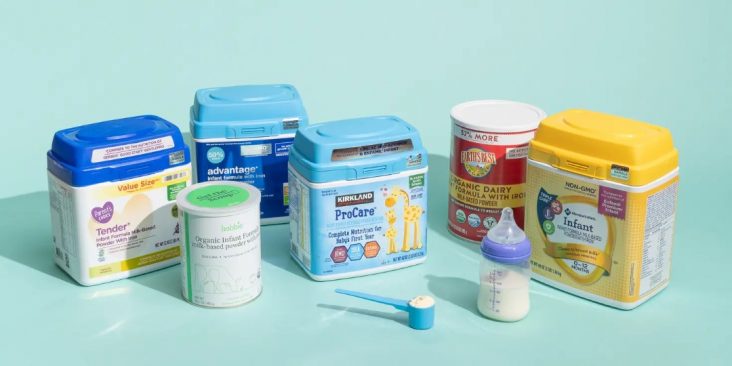Choosing the best formula for your baby can feel like one of those “weight of the world” decisions as a new parent. You want the most nutritious option for your little one’s body and brain…but you also don’t want to upset her tummy.
If you’re committed to an organic lifestyle, the task can feel even more arduous, since the vast majority of baby formulas aren’t crafted with certified organic ingredients. Thankfully, if that’s what you’re looking for, some of the most trusted names in the industry have developed organic baby formula options.
What is organic baby formula?
Organic baby formula comes from milk products produced without using pesticides, herbicides, antibiotics or growth hormones. While conventional formulas may meet some of these qualifications, organic baby formulas are made exclusively with organic milk and organic ingredients, explains Tina Feeley, M.D., a pediatrician and member of the What to Expect Medical Review Board based in Chestnut Hill, Massachusetts.
According to the U.S. Department of Agriculture (USDA), organic products must be made using certain production standards, such as minimizing the use of synthetic materials and maintaining and improving soil and water quality. Products have to be made with substances approved by the USDA — and they have to be produced without any prohibited methods (think genetic engineering, for instance). All products are overseen by an agent authorized by the USDA National Organic Program and must follow all USDA organic regulations.
Are organic formulas better for babies than conventional options?
Steven Abelowitz, M.D., F.A.A.P., a pediatrician and regional medical director of Coastal Kids Pediatrics in Newport Beach, California, says that while there are theoretical benefits of organic formula (such as the absence of growth hormones, genetically modified ingredients and pesticides, for instance), research on the subject doesn’t show a clear, long-term health advantage to using organic formula over conventional. When you’re looking at outcomes of babies who were served organic versus conventional formulas, the benefits are “quite slim,” he says.
The price tag also tends to be higher for organic formulas, Dr. Abelowitz notes. “I always say for parents, if the cost is not inhibitive … then having that theoretical benefit of non-organic versus organic could be a consideration that parents want to take into account,” but again, only if the prices of organic formula fit your budget.
Dr. Feeley recommends thinking about why you would like to use organic formula. If it’s because organic foods are an important part of your household’s approach to eating, then a certified organic formula will likely be the best fit for you. But if you’re looking for something specific in a formula — like no growth hormones in milk, for example — you could look for either an organic or conventional formula that doesn’t have any hormones.
While each formula is different, both organic and conventional picks often include nutrients that are beneficial to your baby, such as:
- DHA (docosahexaenoic acid) and ARA (arachidonic acid), which help baby’s brain, vision and immune responses grow
- Lutein, which helps baby’s eyes develop
- Prebiotics, which are designed to support immune and gut health. A common prebiotic you’ll notice on formula labels is HMO, aka human milk oligosaccharides, which are found in breast milk. The verdict is still out on whether or not prebiotics make a big difference for your little one, but they’re not thought to hurt, says Dr. Feeley.
As always, talk to your pediatrician about what matters for you when deciding on a baby formula (organic or not) and they can help you decide.
Types of organic baby formula
If you select an organic formula for your little one, note that there are a few main types:
- Milk-based: As you might expect, milk-based formula is made with cow’s milk — it’s just been altered to more closely resemble breast milk and provide the right balance of nutrients for infants. This is the most common type of formula, for both organic and conventional picks.
- Partially hydrolyzed: These formulas have milk proteins which have been partially broken down, which may help babies that struggle with colic or gas, for instance.
- Soy-based: These formulas are made from soy proteins and are often used in place of milk-based formulas. The AAP recommends that soy-based formulas only be used in rare situations, so don’t use one unless your pediatrician recommends you do so.
How to choose the right organic baby formula for you
It can feel confusing trying to select an organic formula that’s right for your family. Take comfort in knowing that all baby formulas sold in the U.S. must meet firm regulations from the Food and Drug Administration (FDA), so any brand you choose will meet essential safety requirements.
That said, here are some other things to do when you’re narrowing down on a formula:
- Consult with your baby’s pediatrician. Your doctor may have more experience with some formulas versus others, in addition to knowing your baby and your family’s wishes, says Dr. Abelowitz. She can help you make an informed decision.
- Look for a USDA Organic seal. These products are certified to meet USDA organic regulations, which specify what ingredients and production methods are allowed. If the formula does not have that seal, you’ll likely see one from a USDA-accredited certifier in its place that says “made with organic…” This means the formula is made with at least 70 percent organically produced ingredients, but not necessarily all organic ingredients.
- Look for helpful nutrients on the ingredients list. Think of the ingredients we listed above: DHA, ARA and lutein, for instance, which are essential for your baby’s mental and visual development. As mentioned earlier, some formulas will also include prebiotics for immune and gut health.
How we made our picks for the best organic baby formula
Here’s how we picked the best organic formulas to highlight:
- We made sure every formula on this list is USDA-certified organic.
- We spoke with three leading pediatricians — Dr. Abelowitz, Dr. Feeley and Dr. Poinsett — to get their expert input on all things organic formula. We also followed guidance from top health organizations such as the AAP and USDA.
- We combed through recommendations from members of the What to Expect community, plus asked our staff, to see what their families have tried and loved.
- We read through online reviews of each formula to hear the experiences of countless parents and caregivers who tested them.
Best Organic Formula Overall
Earth’s Best Organic Formula

Registry List:
Amazon Add to Registry
Buying Options:
Amazon $28 for 21 oz See Now
Target $28 for 23.2 oz See Now
Walmart $28 for 21 oz See Now
Pros: Widely available, one of the most affordable organic formulas
Cons: Some reviewers say it’s hard to mix
Why We Love It
Earth’s Best has everything from formula to purees to toddler food. All of their formulas are organic, including their well-loved Organic Dairy Infant Formula with Iron. This brand is easily a favorite of What to Expect community parents when it comes to organic formulas, and it’s easy to see why.
Made from organic milk without synthetic pesticides or fertilizers, this USDA-certified organic formula offers up all the nutrition your baby needs, plus nutrients like DHA, ARA, lutein and prebiotic fiber, which help support brain and vision development, plus immune and gut health.
While every infant is different, reviewers and What to Expect community moms praise Earth’s Best Formula for how well their babies reacted to this formula. “We use Earth’s Best Organic with LO and also used it with my first,” shared one community parent. “They both have done great with it, no issues, and a huge plus for me is that it has no bad smell.” Whether you’re supplementing with formula or strictly bottle-feeding, this feels like a win-win.
(Want more options? Earth’s Best offers more formulas in the infant range, including gentle and sensitive varieties.)Community Reviews
“I used [Earth’s] Best with my first child and she did very well with it. It also did not make her stool smell really foul like other formulas did and that was a huge plus for me.”- tclemmons
“I EBF (pumped only due to latching issues) and started loosing milk at around 7 months. So from that point until 1 year, we supplemented with Earth’s Best. We had a great experience with it.”- Pontinka
“My first was EFF with Earth’s Best and I really liked it.”- simone1919
Best Formula with Prebiotics
Happy Baby Organic Infant Formula

Registry List:
buybuyBaby Add to Registry
Buying Options:
buybuyBaby$30 for 21 oz See Now
Target$30 for 21 oz See Now
Bed Bath & Beyond$30 for 21 oz See Now
Pros: Mild smell, consistency is fairly comparable to breast milk
Cons: Gets foamy when you shake it
Why We Love It
Happy Baby Organic is packed with all the necessary “good stuff” for baby’s development, including vitamin D, DHA, ARA and prebiotics. Happy Baby formula also boasts the full USDA certification, with milk that comes from cows raised on organic farms. And if you have to switch back and forth between formula and breast milk or are making a full transition, you should know: Parents rave that this is a great formula for the task, noting babies seem to go from breast to bottle-feeding quite easily when presented with this formula.
“My baby was EBF until 7 months and then I slowly mixed the formula in with breastmilk over the course of a month until he was on all formula,” shared one What to Expect community parent. “I researched formulas OBSESSIVELY because I felt so much guilt for not giving breastmilk until 1 year (my original goal) but I just couldn’t pump anymore. Baby transitioned great to this formula and didn’t have any gas or constipation issues.”Community Reviews
“I used happy baby organics with my first baby starting at 10 months and we had no issues!” – corrlee
“I like Happy Baby. It’s very easy to find.”- Hatched45
“Happy Baby Organic Formula – little one loves it and you can get it at Target or Wegmans. … We tried this one first and he’s done great.”- jandmgrant
Most Affordable Organic Formula
Parent’s Choice Organic GMO- and Gluten-Free Powder Baby Formula

Buying Options:
Walmart$69 for 92.8 oz See Now
Pros: Lower cost, provides all the essential nutrients, includes nutrients like DHA and lutein
Cons: Only sold at Walmart, may have to buy online
Why We Love It
At 79.7 cents per ounce, this organic formula from Parent’s Choice is one of the most affordable organic picks on the market — yet still offers all the essential ingredients your baby needs. Made with organic milk and packed with DHA, AHA, lutein and vitamin E, this USDA-certified formula is a great option for your little one. Reviewers praise its lower price point and generally revel in how well their babies take the formula.
One thing to note: It’s not as widely available, as it’s only sold at Walmart — and some reviewers report that they can’t find it in their local stores and have to buy it online. If you prefer the convenience of Prime shipping, Amazon’s Mama Bear Organic Formula is another highly rated, lower-cost option.Community Reviews
“I use parents choice brand formula ..I tried two different kinds of Similac first and he took this one the best ..bonus that it’s half the price!”- kimmy286
“I’m using parents choice as well and no problems.”- aprilskirby
“Our first daughter took Parents Choice without any trouble. And definitely cheaper.”- bmurphy2015
Best European-Alternative Formula
Bobbie

Buying Options:
Bobbie $104 for 4-pack See Now
Pros: Easy-to-use website, includes all the essential nutrients, subscriptions available, female-founded company
Cons: More expensive than others
Why We Love It
Some parents are curious about European formula brands, but it’s important to remember that those products haven’t been approved by the FDA and come with risks, such as the formula losing nutritional value if it’s not stored correctly, for instance. Enter: Bobbie, a European-style organic infant formula made in the U.S. that meets FDA guidelines. This USDA-certified organic pick uses pasture-raised dairy and sources key ingredients like whey and casein from small, organic family farms across the country.
It includes DHA and ARA, and the subscription-based shipping model means you’ll never have to worry about running out of formula. (If you prefer, you can buy cans one at a time, or check out the brand’s special starter bundle.) And on top of being the only female-founded, mom-led formula brand in the U.S., Bobbie recently received the Clean Label Project Purity Award and Pesticide-Free Certification. That means the formula was evaluated for substances like industrial and environmental toxins and contaminants, commonly used pesticides and more.
Lots of moms in the What to Expect community love Bobbie, and What to Expect’s Art Director, Alexandra Bisonó, has first-hand experience using this formula with her little one. “We felt good and that we could trust feeding our baby Bobbie because of the simple, straightforward ingredients that made it easy to understand where our child’s nutrition was coming from,” she says.
Note that as of late April 2022, Bobbie is temporarily at capacity for new customers due to the formula shortage. While existing subscribers will continue to receive their formula, new customers won’t be able to sign up right now. You can, however, sign up for Bobbie’s waitlist to hear more details in early June of the store’s reopening.Community Reviews
“Bobbie mamma here! My LO LOVES Bobbie. He’s always clamoring for more. Easily digestible and the texture is silky smooth…it really mixes well with water.”- lentillil
“We supplement with Bobbie as well and baby loves it so far!”- firsttimemom818
“I breastfed and pumped for the first 8 weeks and started introducing a few bottles of Bobbie a day and my baby’s poops even look the same. We like it so far. They sell a starter pack which is 2 canisters for the price of 1.”- MSL87
Best Formula for Sensitive Tummies
Burt’s Bees Baby Ultra Gentle Organic Formula

Registry List:
Amazon Add to Registry
buybuyBaby Add to Registry
Buying Options:
Amazon $44 for 34 oz See Now
buybuyBaby $32 for 23.2 oz See Now
Walmart $51 for 23.2 oz See Now
Pros: Easy to mix, good for sensitive tummies, better smell than other formulas
Cons: More expensive than others
Why We Love It
If your pediatrician recommends a gentle formula for your baby, ask her about Burt’s Bees Baby Ultra Gentle Organic Formula. This partially hydrolyzed pick is the brand’s most gentle formula, which includes proteins that are specially made for sensitive tummies. It’s designed to help reduce fussiness, gas and crying while providing all the nutrition your baby needs. This formula also includes DHA to help baby’s brain and eyes develop, as well as calcium, iron and vitamins D, E and K.
What to Expect community parents who have babies with sensitive stomachs report success with this formula, as do tons of reviewers online. (In particular, many were impressed with how well it mixed in comparison to other formulas — a win for caregivers everywhere.) And while it can be challenging to find a formula that’s both organic and gentle, this pick is USDA-certified organic and doesn’t have any added hormones, antibiotics, preservatives or GMOs.Community Reviews
“I’ve been supplementing with burts bees organic gentle.”- Kt8705
“all I gotta say is burts bees gentle from Amazon purple and white can. only one she would take”- tasha0




9 Pings & Trackbacks
Pingback:อั้นน้อย เทียบอัตราจ่ายหวยกับ LSM99
Pingback:5 หวยหุ้นยอดนิยม ในการแทงหวย LSM99
Pingback:เสื้อสูทผู้หญิง
Pingback:จดทะเบียน อย
Pingback:ชั้นวางสินค้าอุตสาหกรรม
Pingback:tattoo shop in khao lak
Pingback:พรมรถ
Pingback:DevOps Consulting
Pingback:bear compound bow